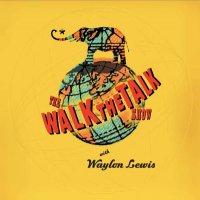The last time I visited my grandpa—a stoic, bullish ex-journalist and novelist—I was mildly surprised to find a book by Dr. Andrew Weil on the coffee table in their living room, the one with views of a golf course. For my grandparents—like most of America—were about as interested in spirituality or self-help as they were in drum circles (Not. At. All). But Dr.Weil knew how to talk about health, and that’s something everyone cares about.
Dr. Deepak Chopra, of course, is to Dr.Weil as Godzilla is to Son of Godzilla. He’s huge.The good doctor is America’s—and the world’s— most popular self-help guru.While he may not be held in the same esteem, he’s bigger than the Dalai Lama (if you go by such things as book sales). I found Deepak sitting anonymously in a plush leather chair in the sterile, faux-Western lobby of the Westminster’s Westin Hotel, where Ken Wilber holds many of his seminars. Dressed like any one of the stylish upper-class Indians I knew at Boston University (tuxedo shirt, designer jeans, black loafers, rhinestone-bejeweled glasses, everpresent cell phone), he was about half the size I expected the larger-than-life as-seen-on-TV Deepak to be. I waited for his cell conversation to end. Finally, he hopped up, and we found a horrible little quiet office.A little hurried and harried, he asked us to get on with it—he had three more interviews that day alone, as well as a sold-out seminar at the Westin’s Chopra Center & Spa. So we started the interview, he pressed auto-pilot, and we were off!
But about one minute into the interview,something happened.I made an obvious observation—and,as everyone later remarked,he talked over it, stopped,backtracked and responded to it.He switched off autopilot.And the words that came out of his mouth from there on out—well let’s just say I could give a shit about self-help,but his poetry made a convert of me. —ed
Waylon H. Lewis for elephant: So, we’re here with Deepak Chopra, which is, I think, by far the biggest moment of our life as a business thus far. Thank you very much.
Dr. Deepak Chopra:Thank you for having me.
ele:So we focus on yoga, organics, buddhadharma, meditation, the environment…
Chopra:Uh-huh.
ele:…subjects that are familiar to you. And you, more than anyone, have been successful at communicating with a Western audience— the last time I saw you, you were talking with Larry King—
Chopra:Uh-huh.
ele:You are able to communicate these ancient principles of Ayurveda or meditation to a Western audience in a way that doesn’t come off as strange, confusing or cultish—but rather is accessible and practical. What’s your secret?
Chopra:Well, my principal aim in everything I do is to give a clear, scientific understanding of what consciousness is. Consciousness is the key to all our problems—whether the environment, personal or social well-being, war, conflict, terrorism, social injustice, human rights, poverty. The major issues that confront our civilization have no solution if tackled by themselves. And that’s what we’ve attempted: people think that if you bring enough money into developing nations you’ll eliminate poverty. Or if you have enough drugs, you will get rid of AIDS. Or if you have a war on terrorism, drugs, cancer—you’ll get rid of it.
ele:Right, if there’s famine, more food will—
Chopra:None of these…yeah. In fact, surplus food is rotting in the warehouses of India right now, but 30 percent of Indian children still starve every night. There’s no solution other than a true understanding of consciousness—and a longing and desire for personal transformation. I don’t think there’s such a thing as social transformation. If a critical mass of people are going through personal transformation, that will automatically heal the environment, heal the rifts in our collective soul, heal disease, get rid of poverty, cure AIDS and malaria. Mosquito nets and drugs won’t do that. That’s because consciousness is the ground of being that simultaneously differentiates things into perception, what we see out there, and differentiates into cognition, our knowingness, in our moods and emotions, our personal relationships, our social interactions, in the environments that we create around us, and in the way we interact with the forces of nature.
We shouldn’t be calling something the environment.That’s a total misperception because that says there’s a biological organism, and then there’s an environment. But the biological organism and the environment are two reflections of the same thing: consciousness. Those trees aren’t trees; they are your lungs. If they don’t breathe, you won’t breathe and ifyou don’t breathe, they won’t breathe. The rivers and waters aren’t just rivers and waters; that’s your circulation. If they are polluted, so are you. And ifyou are polluted, so are they [laughs]. The air is not just the atmosphere; it’s your breath. The earth is not just the ground over there; it’s your physical body. Because you and the earth recycle [one another] all the time. So unless you have an emotional and spiritual relationship with your extended body, which you call the environment—the totally wrong word—there’s not going to be any healing. And for that shift in perception, you have to have a shift in consciousness.
ele:You are referring to something that Buddhists refer to as dual-ity. You say, I’m here—

Chopra:That’s right.
ele:And the environment is over there. And then you don’t care about the environment, or you are passionate about it and will blow up SUVs because you care about it so much.
Chopra:That’s it: dualistic thinking. Thinking mind and body is dualistic. There’s no such thing as a mind-body connection—they are the same thing. There’s no such thing as a biological organism and the environment—they are the samething. In fact, there’s no such thing as meand you. The whole idea that you exist as a person is a total misperception of reality.
ele:Right. That’s ego.
Chopra:Yeah. There’s no such thing as a person, you know. Personal identity is provisional, impermanent and constantly transforming. It is totally transient. Just to even have the idea that I exist as a person allows me to then see other people as persons. And that, of course, is the beginning of all the problems.
ele:It’s interesting to hear someone who is probably more famous than anyone we’ve interviewed before say that, you know, you don’t exist as a solid entity.
Chopra:Well, it’s a fact. Personal identity is transient, impermanent and provisional. I mean, I’m not the same person I was five years ago—physically, emotionally, intellectually. Nor, hopefully, do I have the same personality. If I was the same person, I’d be doomed to eternal senility, wouldn’t I? If you don’t change, you are doomed.
ele:How does that connect to your book, Ageless Body, Timeless Mind?
Chopra:Ageless body refers to the physical universe and timeless mind refers to universal consciousness.
ele:That’s not an attempt to preserve this self—to preserve the illusion of a solid entity and be young forever?
Chopra:No. If there is harmony of the elements and forces between what you perceive as your personal body and what you perceive as your universal body, it’s a biological fact: there’s less entropy.
ele:Right, and you are healthier.


Chopra:It’s a by-product.
ele:You eat better and exercise. When you were talking about the rivers and my circulation, and the trees and my lungs, it reminded me of how you discuss God, which as a Buddhist is an idea that I’ve never been too familiar with. It seems like your conception of God is like Henry David Thoreau’s: it’s universal. It’s inside—the Kingdom ofGod is with- in. What is God?
Chopra:God is as we are. God is our highest instinct: to know ourselves. When we are scared, then God is a protector. When we are achievers, God is a control freak—a dysfunctional parent. When we are at peace, then God is the peace that gives us the understanding that Christ talks about. When we listen to intuitive responses, then God is the redeemer. When we are creative, God is the creator. When we are visionary, then God is the God of miracles, the archetypal domains of consciousness that the Buddhists talk about—the peaceful and the wrathful deities. Buddhists talk about nirmanakaya, which is the physical realm, and sambhogakaya, the subtle realm including all these non- local archetypal domains, and then dharmakaya, the field ofnirvana,beyond all duality.
As we evolve, our image and projection of God changes. But we must remember that they are all projections of ourselves—so before you come around to ask questions there’s no God. You create God in your image. Unlike what Christians say, that God created us in his image—it’s the other way around. We create God in our own image. All experiences of God are projections except the final one, when you are in the state of dharmakaya, or nirvana, beyond duality. Then you are God: “I used to be an atheist until I realized I was God!”
ele:Huh. [pause] There’s this quotation from the Bible that says—or God says—“Be still with me,” or something.
Chopra:No, it’s: “Be still and know that I am God.”That’s Psalm 44 in the Old Testament.
ele:I was just reading that you were talking about that as the way to connect with…well, not to connect with God, but—
Chopra:To be.
ele:To be one with God?
Chopra:To be one with the universal consciousness.
ele:Is that a different idea than the Christian God?
Chopra:If you look at Christianity, Judaism, Hinduism or Islam, you will find all the stages of God. These stages are channeled in particular stages of consciousness—fear, creativity, trying to achieve…The best way to think of God is: Generation, Organization and Delivery. G stands for generation—
ele:The G in G–o–d.
Chopra:But Delivery also includes Destruction, so you can reconstruct. The three forces of nature are creation, organization, dissolution—and then creation again.
ele:Sounds like the process of meditation.
Chopra:Yeah. It’s the process of life. Subatomic particles. I just finished a movie called How to Know God.
ele:The bottom line ofelephantis to help people— through whatever gateway, whatever their passion is. To be of benefit to the world and other people. On a basic level, what would your advice be for whatever people are out there doing—if they are selling insurance at a big insurance convention, [gestures to the hotel] or whatever? How—in a practical way, whether we practice meditation or not—can we be of benefit?
Chopra:You can be ofbenefit by constantly engaging in self-reflection, asking yourself what’s your real identity and how do you wish to actualize your deepest intention? Who are we, as human beings creating this magazine, and what do we want to achieve with this? Then look for like-minded people, and engage in reflection and dialogue with them. Hang out with the right crowd. Just because they are a [big] company, reaching a lot of people, doesn’t mean anything. Okay? You need to hang out with the right crowd.
For more: http://podcast.onsight-media.com/elephant/elevision.htm or chopra.com








Read 6 comments and reply